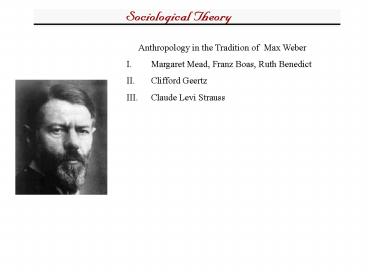Anthropology in the Tradition of Max Weber PowerPoint PPT Presentation
1 / 11
Title: Anthropology in the Tradition of Max Weber
1
- Anthropology in the Tradition of Max Weber
- Margaret Mead, Franz Boas, Ruth Benedict
- Clifford Geertz
- Claude Levi Strauss
2
Margaret Mead
- Student of Franz Boas
- Spread the gospel of cultural determinismopposed
biological determinism in the social sciences
- Believed in the plasticity of culture
- An important figure in the culture and
personality school of thought - Helped move the discipline away from salvage
anthropology - Viewed anthropology as a science
- Saw the diversity of societies one big historical
laboratory
3
- Brought ethnographic fieldwork and cultural
relativism into public viewshe cared about
public education - Fought ethnocentrism
- Saw the study of other cultures as a way of
understanding ones own - I have spent most of my life studying the lives
of other peoplesfaraway peoplesso that
Americans might better understand themselves. - Sought to establish an authoritative role for the
anthropologist in modern society
4
What do these people in Chapter 5 have to do with
Max Weber?
5
Clifford Geertz
- associated with a different sort of shift within
anthropology and social theory - He liberated anthropology from just the facts.
What does this mean?
6
The concept of culture I espouse....is
essentially a semiotic one. Believing, with Max
Weber, that man is an animal suspended in webs of
significance he himself has spun, I take culture
to be those webs, and analysis of it to be
therefore not an experimental science in search
of law, but an interpretive one in search of
meaning. It is explication I am after,
construing social expressions on their surface
enigmatical.(Salzman, p. 73)
7
Clifford Geertz Interpretive Anthropology
- Understanding cultures as systems of meaning
- Searching for the ethos of a culture
- Thick description rather than explanations
- Interpretations are always eminently contestable
8
Contextualization Culture is not a power,
something to which social events, behaviors,
institutions, or processes can be causally
attributed it is a context, something within
which they can be intelligibly--that is, thickly,
described. The Interpretation of Cultures, p. 14
Balinese Cockfight
9
Berreby Article Geertz as an anti-anti-relativi
st What does that mean?
10
So why are his own disciples saying he didnt go
far enough?
- Postmodern critics
- Accuse Geertz of holding on to the belief that
anthropologists have a privileged standpoint - Challenge ethnographic authority
- Tend towards extreme relativism no privileged
form of knowledge - Deny any special status to science
11
- Claude Levi-Strauss
- the idea that cultures have a deep symbolic
structure - this structure enables us to understand the
social patterns of daily life
Salzmans chapter summary pp. 85-86.

